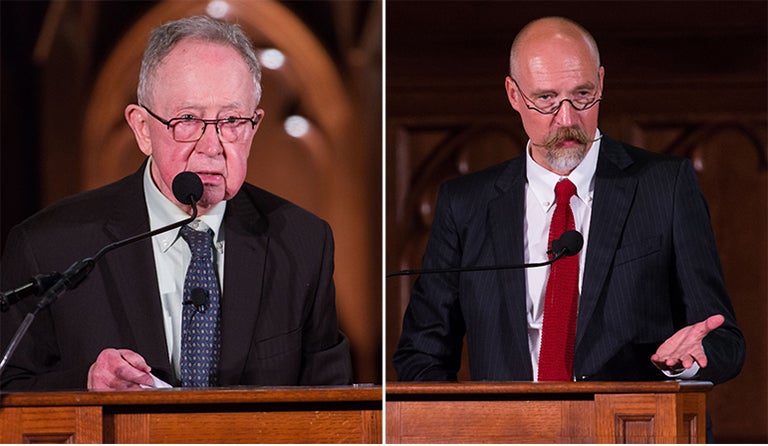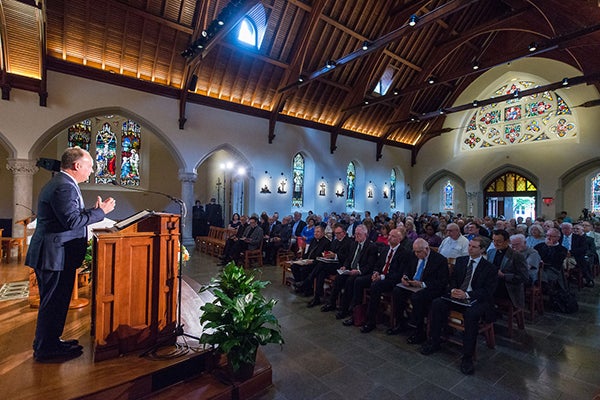Title: International Theology Scholars Commemorate 500th Anniversary of Lutheran Reformation
Lutheran and Catholic scholars from around the world gather at Georgetown to commemorate the 500th anniversary of the Lutheran Reformation and explore its lasting and global impact on history, theology, philosophy and culture.

– Lutheran and Catholic scholars from around the world gathered at Georgetown earlier this month to commemorate the 500th anniversary of the Lutheran Reformation and explore its lasting and global impact on history, theology, philosophy and culture.
The schism from the Roman Catholic Church, initiated in 16th-century Europe by Martin Luther and his publication of the Ninety-Five Theses, was a major historic event, the consequences of which are still relevant in inter-Christian relations 500 years later, according to scholars and panelists participating in the Sept. 14-15 conference.
Georgetown’s Rev. John W. O’Malley, S.J., university professor of theology, stressed the importance of unity among Catholics and Lutherans during his keynote address on Thursday, September 14.
He said that as far back as the Council of Trent, the Catholic Church sought cohesion rather than division. “The Council was intended as an instrument of reconciliation, not alienation,” he said.
Emphasizing Unity

Kathryn Johnson, director of ecumenical and interreligious relations at the Evangelical Lutheran Church in America, was among the conference presenters examining the history of the Reformation, Luther’s place in religious and historical discourse and the current state of Catholic-Lutheran collaboration.
“This is an anniversary that invites us to claim the unity that we know we are called to live in,” she said.
Bishop Denis Madden from the Archdiocese of Baltimore spoke during the Ecumenical Service of Word and Song, which opened the two-day conference to emphasize unity and healing.
“What unites us is far greater than what divides us,” he said, referring to the common faith in Christ and the gospels that overshadows lingering doctrinal differences between Catholics and Lutherans.
Persistent Misunderstandings
Despite the progress that has been made in ecumenical dialogue, participants said there are still persisting differences and misunderstandings between Catholics and Lutherans.
“Too often are we engaged in oppositional ecclesiologies,” said Susan K. Wood, professor of systematic theology at Marquette University. “Ecumenical unity is not uniformity. We keep our history and our differences, but we should be able to transcend them.”
Kenneth Appold, a professor of Reformation history at Princeton University, emphasized Luther’s fight against the institution of the Catholic Church rather than its ideology, while Peter Neuner, professor of theology at the University of Munich in Germany, said the Reformation was “not a revolution against the Pope, but a breakthrough in Christian theology.”
Posthumous Biographies
Presenters also highlighted the malleability of Luther’s image in historical discourse, how he was viewed in different time periods as a champion of reason, modernity, autonomy, cultural unity and even Marxism.
“People who make history have posthumous biographies,” Neuner said. “This fact is especially true of Luther. The images of Luther that were designed in the past 500 years show more about the philosophical and religious trends of the given time than about the reformer of Wittenberg.”
Neuner added that “the memory of the Reformation should not bypass Luther’s own reformation.”
Human Questions
Panelists also discussed the evolution of how the Reformation is taught as an interdisciplinary topic.
Julia Lamm, a theology professor at Georgetown, said the ways in which the Reformation is taught to today’s students has evolved.
“Students are not all Christians who have deep knowledge of their background. [We have] Muslim students, Jewish students,” she explains. “With this pluralism of religion comes also a methodological pluralism and pluralism when it comes to areas of specialization.”
“How you present things has changed fundamentally,” she added. “What I find is that teaching the Reformation addresses fundamentally human questions questions of freedom, of identity and of boundaries.”